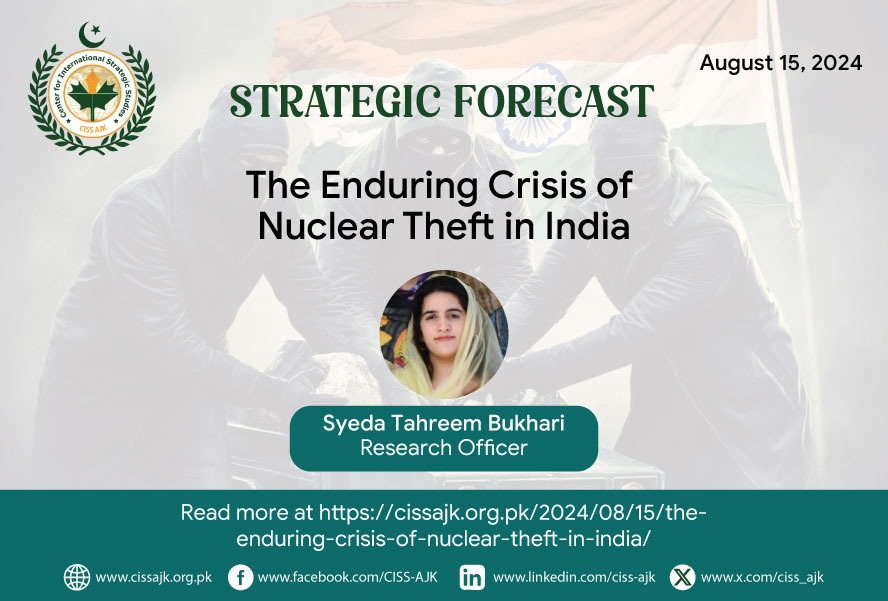On August 9, 2024, a three-member gang was arrested from Bihar for their alleged involvement in smuggling 50 gm of the radioactive substance, Californium. This incident is another pearl in a string of nuclear thefts in India. Even last month, five men were arrested from Dehradun with a black box containing radioactive substance stolen from Bhabha Atomic Energy Center in Mumbai. Three years ago, another mob was arrested from Lucknow involved in the smuggling of 340 gm of Californium. A chronology published by the South Asia Strategic Stability Institute (SASSI) shows that from 1994 to 2021, 18 events involving the theft and loss of more than 200 kg of nuclear material were documented in India. Though India was involved in such incidents since 1970s, there were rumors of Indian involvement in the theft of nuclear fissile material; in the 1980s and 1990s, the threat grew significantly. The CIA finds out that India was attempting to create a highly advanced hydrogen bomb in the late 1980s. A $24 million consignment of beryllium was intercepted in Vilnius in 1994, thanks to a tip. Although the consignment was intercepted before it could reach the customer, it was assumed that the buyer was either from North Korea or India.
Series of nuclear theft incidents in India
The first recorded incident of nuclear smuggling in India dates back to November 1994 from Domiasiat region in India, where Meghalaya’s police arrested gang of four members involved in smuggling of 2.5 kg of Uranium. Another major nuclear theft incident reported in 1998 where an opposition politician was arrested from West Bengal for his alleged involvement in smuggling of about 100 kg of Uranium. A container carrying highly radioactive substance Uranium stolen from Research facility in Eastern India in December 2006. Its radiations could have hazardous effect within a range of 1.5 kilometers. Navi Mumbai Crime Branch arrested three men carrying 5 kg of depleted Uranium. In 2018, five men arrested in Kolkata selling 1kg Uranium worth three crore rupees in open market. Another racket involved in nuclear embezzlement exposed by Maharashtra Anti-Terror Squad in May 2021 where a 7 kg Uranium was in possession of scrap dealer. This incident exposed how vulnerable India’s nuclear safety command and control is. Within a month, another incident reported in Jharkand where police arrested seven members gang who were planning to sell 6.4 kg of Uranium in black market. In the same year, two suspects were arrested near Kolkata airport who were allegedly involved in smuggling of 250 gm of Californium that is not a natural element, produced in a laboratory.
These recurring incidents of nuclear thefts highlights India is not focusing on the international requirements for security that must be implemented by states working on civilian nuclear programs. These requirements are communicated by the IAEA through information circulars and other technical guidelines.
IAEA safeguards regarding safety and security of nuclear weapons
The UN Convention on Nuclear Safety and the Convention on the Physical Protection of Nuclear Material (CPPNM) and its 2005 Amendment are the primary international legal frameworks regarding nuclear security adopted under the IAEA’s authority signed and ratified by India. The CPPNM lays out legal requirements for the Parties about the following: the criminalization of specific nuclear material-related offenses; international cooperation, for instance in cases of theft, robbery, or any other unlawful taking of nuclear material, or the credible threat thereof; and the physical protection of nuclear material used for peaceful purposes during international transport. The Convention requires parties to guarantee that nuclear materials for peaceful purposes are protected at the agreed levels (as defined in IAEA INFCIRC/2251 and categorized in Annexes I and II of the Convention) during international transport across their territory or on ships or aircraft under their jurisdiction. Additionally, under some circumstances, nuclear material used for peaceful purposes while being utilized domestically—including its storage and transportation—may be covered by the Convention.
Parties agree that unless they have guarantees that nuclear materials will be safeguarded throughout international transportation in compliance with the levels of protection specified by the Convention, they will not export, import, or permit the transit of nuclear materials through their territory.
Threat to regional stability
The parties also commit to exchanging information regarding lost nuclear items to expedite their recovery. India’s failure to comply with nuclear security measures threatening the regional stability of South Asia as there is a huge risk regarding hazardous material falling into wrong hands. Contrary to this Pakistan has a robust nuclear safety command and control mechanism. IAEA Director General Rafael Mariano Grossi in his visit to Pakistan last year hailed Pakistan’s nuclear safety record ‘impeccable’.
It is paramount for the nuclear weapon states to make sure their nuclear materials are safe. While, in a race to enhance nuclear stockpiles, nuclear threat would be looming threatening global peace and security. SIPRI Year book 2024 also raised concerns regarding growing number and types of nuclear weapons in the world and India is among those whose nuclear arsenal has expanded in 2023 with a focus on long-range missiles. India’s jump into nuclear arm race without having effective nuclear safety and security measures, would have implications not only for South Asia but also for the world as its long range missiles are aiming towards the US and Canada as well. The international community must demand a thorough investigation behind these prevalent nuclear theft incidents. An independent nuclear regulatory body must be developed by India that in order to control, regulate and supervise all matters related to nuclear safety and security.

